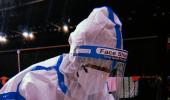With an aim to provide some relief to healthcare workers on the frontlines of the COVID-19 battle, a 19-year-old Mumbai student has developed a compact ventilation system for PPE kits.

Nihaal Singh Adarsh, a second-year student of K J Somaiya College of Engineering, Mumbai has developed a belt-like wearable ventilation system for PPE kits.
He named it Cov-Tech Ventilation System which comes with a lithium-ion battery that lasts for 6 to 8 hours.
"Cov-Tech Ventilation System is like you are sitting under the fan even while you are inside the PPE suit. It takes the surrounding air, filters it and pushes it into the PPE suit. Normally, due to lack of ventilation, it is hot and humid within the PPE suit. Our solution offers a way out of this uncomfortable experience, by creating a steady airflow inside," Nihaal explained.
The design of the ventilation system ensures a complete air seal from the PPE kit. It provides a breeze of fresh air to the user in a gap of just 100 seconds.
Nihaal says his doctor mother's necessity became the source of inspiration for his invention.
Nihaal's mother, Dr Poonam Kaur Adarsh is a doctor who has been treating COVID-19 patients at her clinic in Pune.
Every day after returning home, she narrates her son the difficulty faced by doctors and nurses, who wear PPE suits and get themselves drenched in sweat.
This led Nihaal to invent something innovative.
He further participated in a design challenge for COVID-related equipment, organised by Technological Business Incubator, Research Innovation Incubation Design Laboratory.
Nihaal started working on the prototype and developed the first model in 20 days.
He got support from Somaiya Vidyavihar University's RIIDL (Research Innovation Incubation Design Laboratory), supported by the National Science and Technology Entrepreneurship Development Board (NSTEDB), under the Department of Science and Technology, Government of India.
After more than six months of hard work, the initial prototype emerged.
It was neck-mounted, sucking in air through U-shaped air inlets, and had pillow-like structures which could be worn around the neck.

Nihaal then gave it to Dr Vinayak Mane of Pune for testing.
"We wanted this prototype to be tested by some unbiased doctors and hence approached Dr. Vinayak Mane. He pointed out that wearing it around the neck will be a big discomfort for doctors and health care workers, due to the constant sound and vibration the device emitted. So, we discarded the prototype and started working on further designs." Nihaal said.
This aspiration for perfection led to the development of around 20 developmental prototypes and 11 ergonomic prototypes till the final product emerged.
For this, he got help from Gaurang Shetty, Chief Innovation Catalyst at RIIDL and CEO of Dassault Systems, Pune.
As per the final design, the product can be worn around the waist, just like a belt.
It can be attached with the conventional PPE kits.
This design serves two purposes -- first, keeps the health workers well-ventilated, while preventing bodily discomfort, and second, keeps them safe from various fungal infections.
"Since the ventilator is worn close to the body, high-quality components have been used and safety protection measures have also been taken care of. When I told my mom that I am going to file a patent for this product, she was very happy. Being a general physician, my mother uses it whenever she goes out for work," Nihaal said.

Nihaal has created a start-up called Watt Technovations, thanks to a grant of Rs 10,00,000 for prototype development and product innovation by the Department of Science and Technology, Government of India.
He revealed that his initial ambitions did not extend much beyond giving a solution to his mother's pain.
"I never thought of going commercial initially. I thought of making it only on a small scale and giving it to the doctors I personally know. But later on, when we made it feasible, I realised that the problem is such a massive one, something our healthcare workers face on a daily basis. That is when we thought of making a commercial plan so that it is available for everyone in need," he said.
The final product that has come is being used in Pune's Sai Sneh hospital and Lotus Multi Specialty Hospital.
The startup plans to scale up its production in May-June 2021.
The product costs Rs 5,499 per piece and is way cheaper than the competitive products that cost around Rs 1 lakh.
Nihaal's team is trying to further reduce the price.
The first batch of the product is already out, with around 30-40 units which will be delivered as trial units to doctors/NGOs across the country.
The next batch of around 100 units is also under production.











 © 2025
© 2025